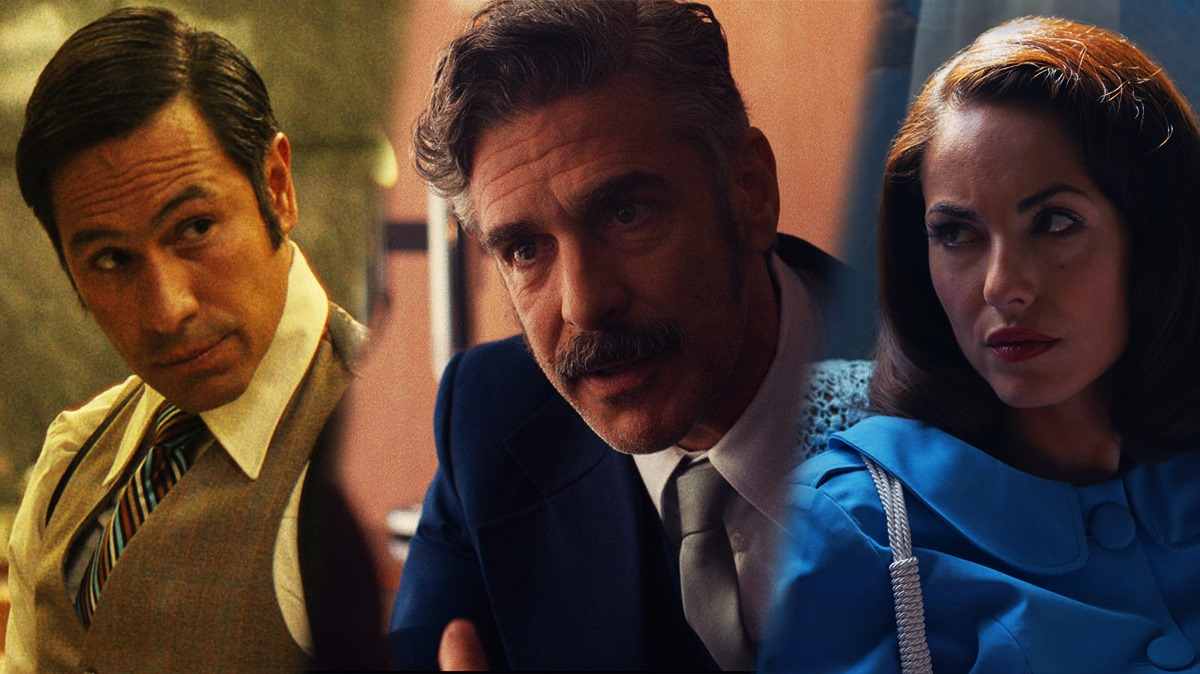In the gripping third episode of Women in Blue, we dive deeper into the complex world of police work and gender discrimination. Following the events of the second episode, where Tito Flores was wrongfully accused of being the Undresser, we see Maria and her colleagues fight against a system that seems determined to silence them. Let’s break down the key events and revelations from this intense installment.
Table of Contents
Women in Blue Episode 3 Recap & Ending Explained

Women in Blue Episode 3 opens with the lingering consequences of Tito Flores being framed as the Undresser. Maria, our determined protagonist, remains convinced of Tito’s innocence. She knows in her gut that this mentally disabled man couldn’t possibly be responsible for the brutal murders plaguing the city.
Maria’s conviction stems from her keen observation skills and empathy – qualities that seem to be in short supply among her male counterparts. The stark contrast between Maria’s approach and that of her colleagues highlights a fundamental issue within the police force: a lack of thorough investigation and a rush to close cases, regardless of the truth.
Alejandro’s Promotion Dreams
A Changing Dynamic
Alejandro, Maria’s husband, has undergone a noticeable transformation since the previous episode. Maria’s decision to join the police force caught him off guard, challenging his preconceived notions about gender roles. While Alejandro isn’t as blatantly misogynistic as some of his peers, he still harbors deep-seated biases that reflect the society they live in.
We see Alejandro grappling with his wife’s new career choice. On one hand, he tries to understand and support Maria. On the other, he makes objectionable requests that betray his discomfort with the situation. This internal conflict paints a vivid picture of a man caught between progressive ideals and ingrained societal expectations.
The Dinner with Mr. Cabos
Alejandro’s excitement about a potential promotion takes center stage as he prepares for dinner with his boss, Mr. Cabos. He asks Maria to keep her new job a secret, fearing that the conservative Mr. Cabos might react negatively. This request underscores the pervasive nature of gender discrimination in their society – even a woman’s career choice can jeopardize her husband’s professional prospects.
Maria agrees to play along, sacrificing her pride for Alejandro’s potential advancement. This decision highlights the compromises women often make to navigate a male-dominated world.
A Costly Revelation
During the dinner, Maria finds herself in conversation with Mrs. Cabos. Encouraged by Mrs. Cabos’ mention of her interior decoration classes, Maria decides to open up about her new role in the police force. This moment of honesty, born from a desire for connection and understanding, proves to be a critical mistake.
The consequences are swift and severe. Alejandro doesn’t get the promotion, and the reason becomes painfully clear – his wife’s career choice is deemed unacceptable. This harsh reality drives home the depth of societal prejudice against women in traditionally male roles.
Maria’s Secret Investigation
Assembling the Team
Undeterred by official roadblocks, Maria decides to pursue her own investigation into Tito Flores’ case. She enlists the help of her colleagues Angeles, Valentina, and Gabina. This clandestine team of women demonstrates the power of solidarity in the face of institutional barriers.
Uncovering the Truth About Tito
The team’s first stop is Tito’s home, where they meet his mother, Norma Hidalgo Juarez. Norma paints a picture of Tito that’s drastically different from the monster portrayed by the official investigation:
- Tito’s mental challenges: A childhood accident left Tito with significant cognitive impairments. He can’t drive or navigate public transport independently.
- The misunderstood kiss: Norma recounts an incident where Tito’s innocent gesture of affection was misconstrued as sexual harassment, leading to unfair labeling.
- Tito’s true nature: Despite his challenges, Tito is described as caring and affectionate – a far cry from the violent killer he’s accused of being.
Forensic Discrepancies
Angeles uncovers crucial forensic evidence that further exonerates Tito:
- Limited fingerprint evidence: Tito’s prints were found only on one victim, Paola.
- Multiple prints: Paola’s body had 19 other sets of fingerprints, suggesting Tito’s presence doesn’t prove his guilt.
- Alternative explanation: The team theorizes that Tito may have simply checked on Paola after finding her, rather than being her killer.
The Witness Account
Maria recalls Jessica’s statement about seeing her sister enter a car before her disappearance. This detail, overlooked by the official investigation, provides a new avenue for inquiry and further casts doubt on Tito’s guilt.
Confronting the Establishment
Armed with their findings, Maria and her team bravely present their evidence to Gerardo, Diaz, Lozano, and other senior officers. Their reception is far from warm:
- Threats of termination: Gerardo responds with anger, threatening to fire the women for their unauthorized investigation.
- Disregard for evidence: Despite the compelling case presented, the male officers refuse to acknowledge the possibility of their mistake.
- Frustration and determination: The women leave the confrontation disheartened but more resolved than ever to uncover the truth.
This scene powerfully illustrates the uphill battle faced by women in law enforcement. Even when armed with facts and sound reasoning, they find themselves dismissed and threatened by a system resistant to change.
Octavio’s Intervention
A Surprising Ally
Octavio emerges as an unexpected supporter of the women’s cause. His actions reveal a nuanced understanding of the system and a willingness to challenge it, albeit cautiously:
- Meeting with Commander Herrera: Octavio advocates for the women’s team to have their own workspace, facing initial rejection.
- Strategic moves: By involving Escobeda, Octavio forces Commander Herrera’s hand, securing a victory for the women.
- Protecting jobs: When Gerardo moves to suspend Maria and her colleagues, Octavio puts his own position on the line to defend them.
The Price of Support
Octavio’s actions don’t go unnoticed or unpunished. The episode concludes with a chilling scene:
- Gerardo’s assault: In a display of raw power and intimidation, Gerardo physically attacks Octavio.
- The warning: Gerardo makes it clear that Octavio should not interfere with the “Herreras” again, hinting at a deeper network of influence and corruption.
- Implications for the future: This violent encounter sets the stage for potential alliances and conflicts in upcoming episodes.
The Ongoing Hunt for the Undresser
With Tito Flores wrongfully accused and deceased, the true Undresser remains at large. This unresolved threat looms over the entire episode, creating a sense of urgency and danger:
- Potential for more victims: The team’s failure to convince their superiors means the killer is free to strike again.
- Race against time: Maria and her colleagues must navigate bureaucratic obstacles while trying to prevent further tragedies.
- Proving their worth: Catching the real Undresser becomes not just a matter of justice, but a way for the women to validate their place in the force.
Themes and Social Commentary
Gender Discrimination in the Workplace
The episode provides a stark portrayal of the challenges women face in male-dominated professions:
- Dismissal of competence: Despite their thorough investigation, Maria and her team are not taken seriously by their male superiors.
- Hostile work environment: The constant threats and belittlement create a toxic atmosphere for the female officers.
- Societal expectations: The reaction to Maria’s career choice reflects broader issues of gender roles and expectations.
The Flaws in the Justice System
Through the wrongful accusation of Tito Flores, the show critiques several aspects of law enforcement:
- Rush to judgment: The eagerness to close the case leads to a miscarriage of justice.
- Ignoring evidence: The dismissal of crucial details that don’t fit the preferred narrative highlights systemic issues.
- Vulnerability of the marginalized: Tito’s mental disability makes him an easy target for a system more concerned with closure than truth.
The Power of Perseverance
Despite the obstacles they face, Maria and her team demonstrate remarkable resilience:
- Continued investigation: They pursue the truth even when ordered to stand down.
- Supporting each other: The women form a tight-knit group, providing emotional and professional support.
- Challenging the status quo: Their actions, while risky, begin to chip away at the entrenched biases within the force.
Looking Ahead
As we move forward in the series, several questions and potential plotlines emerge:
- Will Octavio join forces with Maria’s team in their unofficial investigation?
- How will the Undresser’s continued freedom impact the city and the investigation?
- Will the discrimination faced by Maria and her colleagues ever come to light publicly?
- What consequences will Alejandro face due to Maria’s career, and how will it affect their relationship?
- Are there more allies within the force who might step up to support the women’s efforts?
Conclusion
Women in Blue Episode 3 delivers a powerful exploration of gender dynamics, institutional corruption, and the pursuit of justice. Through Maria’s determination and the collective efforts of her team, we see a glimmer of hope in a system resistant to change. As the hunt for the real Undresser continues, viewers are left on the edge of their seats, eagerly anticipating the next move in this high-stakes game of cat and mouse.
The show masterfully weaves together personal struggles, professional challenges, and a gripping criminal investigation. It forces us to confront uncomfortable truths about societal biases while rooting for a group of women who refuse to back down in the face of overwhelming odds. As we look forward to the next episode, one thing is clear – the women in blue are just getting started, and their fight for justice and equality is far from over.












